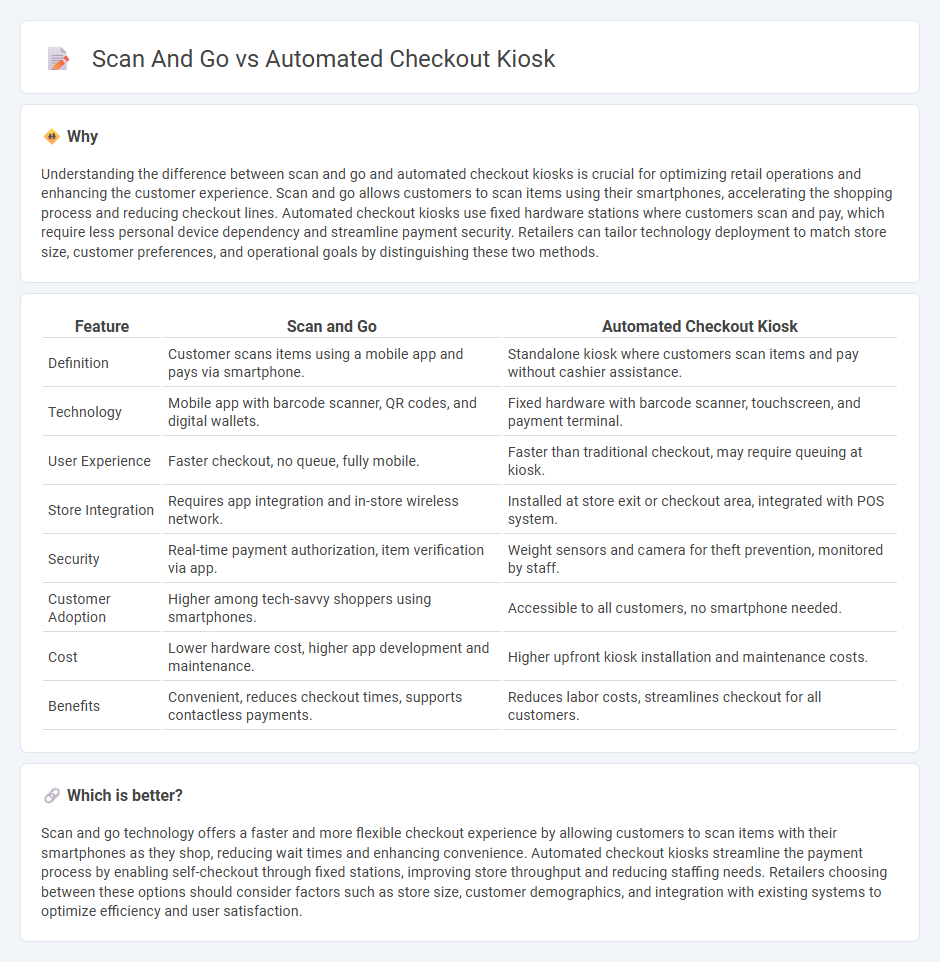
Scan and go technology allows customers to use their smartphones to scan items as they shop, enabling a seamless and contactless checkout experience. Automated checkout kiosks streamline the payment process by allowing shoppers to scan items at a self-service station, reducing wait times and labor costs. Explore the advantages of scan and go versus automated checkout kiosks to find the best fit for your retail operation.
Why it is important
Understanding the difference between scan and go and automated checkout kiosks is crucial for optimizing retail operations and enhancing the customer experience. Scan and go allows customers to scan items using their smartphones, accelerating the shopping process and reducing checkout lines. Automated checkout kiosks use fixed hardware stations where customers scan and pay, which require less personal device dependency and streamline payment security. Retailers can tailor technology deployment to match store size, customer preferences, and operational goals by distinguishing these two methods.
Comparison Table
| Feature | Scan and Go | Automated Checkout Kiosk |
|---|---|---|
| Definition | Customer scans items using a mobile app and pays via smartphone. | Standalone kiosk where customers scan items and pay without cashier assistance. |
| Technology | Mobile app with barcode scanner, QR codes, and digital wallets. | Fixed hardware with barcode scanner, touchscreen, and payment terminal. |
| User Experience | Faster checkout, no queue, fully mobile. | Faster than traditional checkout, may require queuing at kiosk. |
| Store Integration | Requires app integration and in-store wireless network. | Installed at store exit or checkout area, integrated with POS system. |
| Security | Real-time payment authorization, item verification via app. | Weight sensors and camera for theft prevention, monitored by staff. |
| Customer Adoption | Higher among tech-savvy shoppers using smartphones. | Accessible to all customers, no smartphone needed. |
| Cost | Lower hardware cost, higher app development and maintenance. | Higher upfront kiosk installation and maintenance costs. |
| Benefits | Convenient, reduces checkout times, supports contactless payments. | Reduces labor costs, streamlines checkout for all customers. |
Which is better?
Scan and go technology offers a faster and more flexible checkout experience by allowing customers to scan items with their smartphones as they shop, reducing wait times and enhancing convenience. Automated checkout kiosks streamline the payment process by enabling self-checkout through fixed stations, improving store throughput and reducing staffing needs. Retailers choosing between these options should consider factors such as store size, customer demographics, and integration with existing systems to optimize efficiency and user satisfaction.
Connection
Scan and go technology and automated checkout kiosks both streamline the retail payment process by minimizing wait times and reducing the need for cashier assistance. Scan and go allows customers to scan items with a mobile device as they shop, while automated checkout kiosks enable users to scan and pay for products independently at a designated station. Integrating these systems enhances store efficiency, improves customer experience, and supports contactless payment trends.
Key Terms
Self-Service
Automated checkout kiosks and scan-and-go systems both enhance self-service shopping by reducing checkout time and minimizing staff interaction. Automated kiosks require customers to scan and pay for items at a fixed terminal, while scan-and-go allows shoppers to use mobile devices throughout the store for a seamless experience. Explore the benefits and differences of these technologies to optimize your retail strategy.
Mobile Scanning
Automated checkout kiosks use fixed scanning stations where customers scan and pay for items, while scan and go leverages mobile scanning technology, allowing shoppers to use smartphones for real-time item scanning and payment. Mobile scanning enhances convenience, reduces wait times, and integrates seamlessly with digital wallets and loyalty programs. Discover how mobile scanning is revolutionizing retail by exploring its benefits and implementation strategies.
RFID
Automated checkout kiosks primarily rely on barcode scanning technology, which requires customers to manually scan each item, while scan-and-go systems often integrate RFID tags that enable instant item recognition without scanning individual barcodes. RFID technology accelerates the shopping experience by allowing multiple products to be read simultaneously, reducing checkout times and minimizing errors associated with manual scanning. Explore the advantages of RFID technology in retail to understand how it transforms both automated kiosks and scan-and-go systems.
Source and External Links
Self-Checkout Kiosks - Advanced camera vision technology instantly recognizes in-stock items without barcode scanning, supporting seamless, touchless payment for faster, staff-free retail checkout experiences.
Self-Checkout Kiosk - Aila's kiosk uses high-resolution computer vision to rapidly scan even challenging barcodes, integrates with major payment terminals, and offers full management and support for hassle-free, scalable retail automation.
RAIN RFID Automated Checkout PoS Systems - Impinj's platform delivers touch-free, automated self-checkout using RAIN RFID technology, streamlining both purchases and returns while incorporating loss prevention features.
 dowidth.com
dowidth.com